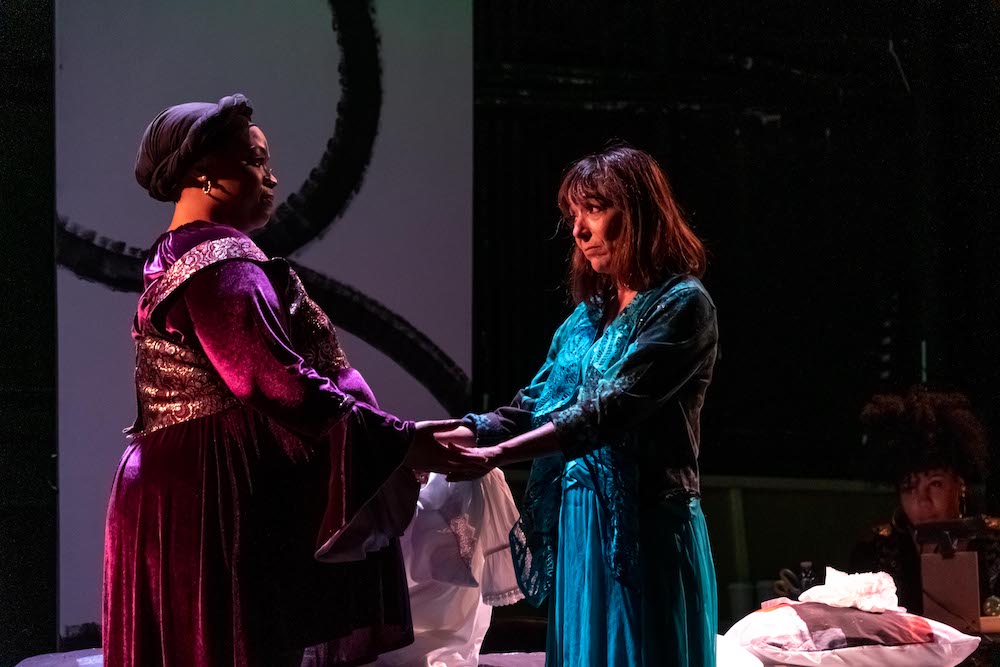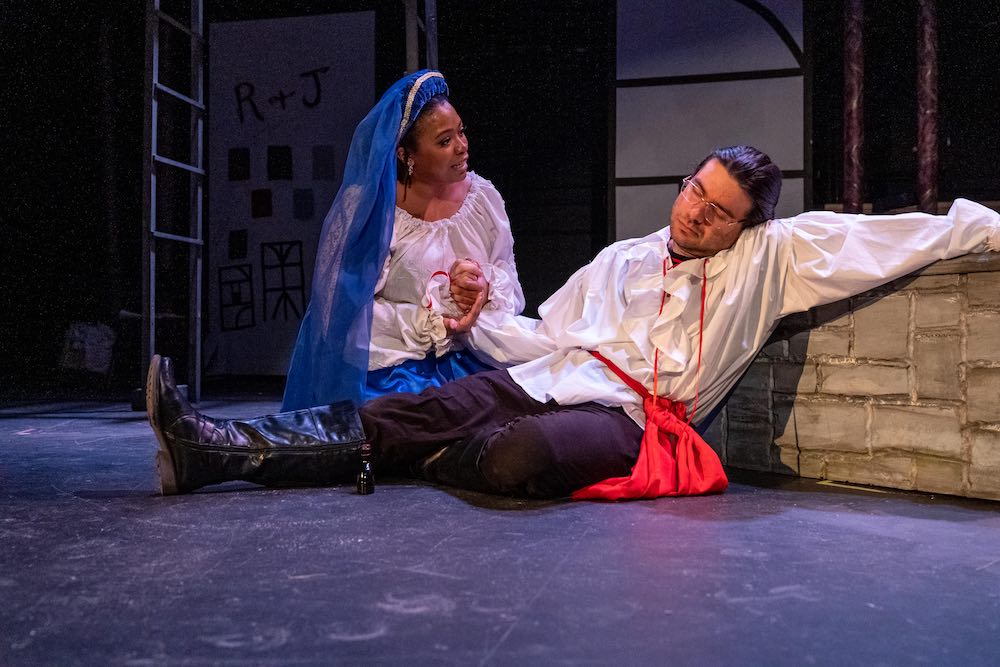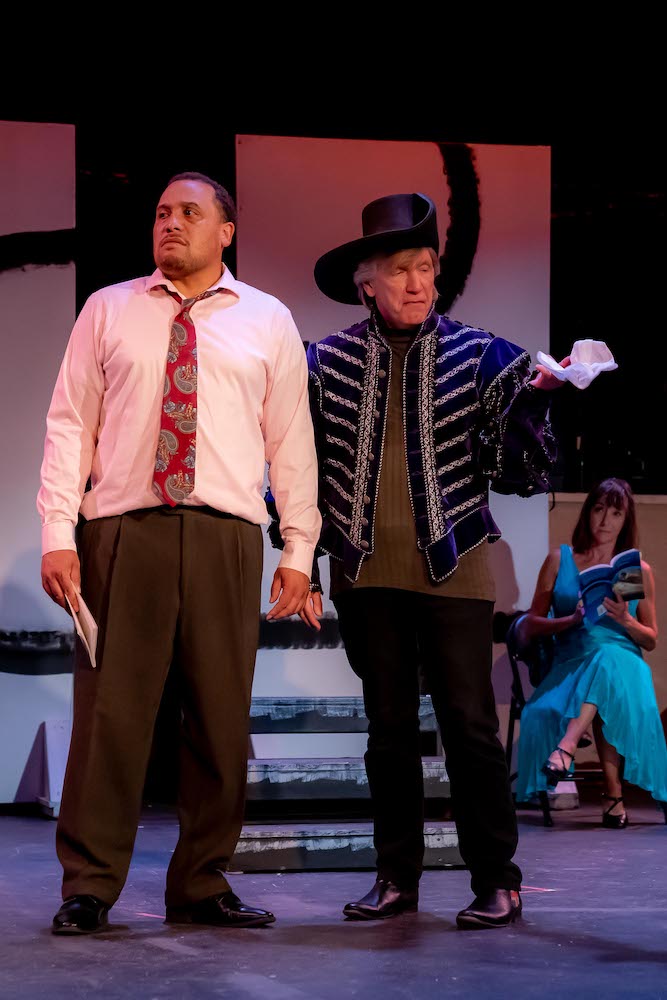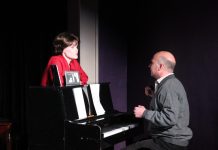In 1982, I got an anonymous racist note after casting two African American soloists in a Montgomery County Gilbert and Sullivan production I directed. In 1991, Arena Stage’s 1991 production of Pygmalion made Eliza and Alfred Doolittle Jamaicans, Caribbean accents and all. So issues around diverse/inclusive casting (then often called “non-traditional” casting) were not a brand-new thing in 1998, when Caleen Sinnette Jennings’s Playing Juliet and Casting Othello made its debut. Still, Hamilton being 17 years in the future, it’s not surprising that members of the shoestring New Vistas theater company in Providence Players’ production of Jennings’s play exhibit a high discomfort level with the racial implications of casting decisions.
With the troupe’s production of Romeo and Juliet 12 days from opening, frantic director Wendy (Dana Gatusso) tries to stem the chaos created by Georgia (Aja Goode), who is not off book and is chronically late for rehearsals, apparently because of boyfriend issues. She is hostile to her Romeo, Chris (Ali Cherangpour), the insecure son of a wealthy theater board member. Then there’s the veteran stage manager, Dave (Bruce Alan Rauscher), who seems to want to direct the show himself. The first portion of the play threatens to go full Noises Off at any moment.

Georgia is the first to explicitly raise racial concerns. She sees herself as a “plain Black” woman, contrary to the text’s description of Juliet: was she cast just because of her race, and because Wendy is a longtime friend? Perhaps Lorraine (Nina-Sophia Pacheco), a lighter-skinned African American actor, should have been cast as Juliet rather than as the Nurse? Kudos here to Jennings for adding colorism to the mix.
The actors’ personal lives interact heavily with their conduct on stage. Georgia is afraid that if she continues with the show, her boyfriend Jimmy (Mack Leamon) will leave her, something Wendy smartly uses to help her finally get into character as Juliet. Then Jimmy appears. More into theater than anyone had thought, he sparks a chain of events that leads to everyone becoming part of a happy couple, getting the R&J production almost instantly on track.
In the second half, the same group is rehearsing Othello. Problem: there is no Othello, the actor playing the role having left the show. Jimmy, who has been working on sets and doing some informal scene work with Wendy, becomes the default lead, solving the immediate problem but leading to disapproval from Dave (who as Iago, doesn’t want an inexperienced scene partner) and Georgia (who doesn’t like her man playing a Black character who obsesses over a white woman and then murders her).

Class differences rear their head as well, as Jimmy worries that college instructor Georgia (not to mention her father) looks down on his blue-collar work. Georgia isn’t thrilled with playing Emilia (don’t Black women often get stuck playing the maid?). Nor is Lorraine happy with playing Bianca, given that her boyfriend’s father already thinks she may be something of a whore. Issues within the couples threaten the rehearsal entente cordiale.
The acting is uniformly first-rate. Rauscher made a particular impression with fine physical acting that underlines Dave’s often meddlesome character. Portraying goodness in a way that is not clichéd is tricky, and Leamon does well with making Jimmy a genuinely nice guy who is not cloying and who works hard at setting things right.
Goode’s Georgia does not back down to anyone, making her voice heard, loud and clear, on any issue confronting the group. Gatusso gives Wendy a nice progression from frazzled to insightful as she helps both Georgia and Jimmy bring out the best in their characters. Cherangpour’s initially nervous Chris gains confidence to the point of being a steadying factor as he directs Othello. Pacheo’s best moment comes near the end, when Lorraine acts decisively on her beliefs.
Jennings’s script calls on the actors to perform bits of scenes from the two Shakespeare plays, which the cast handles creditably. The longest and best of these is a persuasive presentation by Jimmy and Wendy of the Othello/Desdemona murder scene. If there is a weakness in the script’s structure, it is that Jennings follows this emotional climax of the show with a series of brief codas concerning the actors’ various romantic relationships.
Beyond consistently good pacing, Eleanore Tapscott’s direction maintains the feel of a rehearsal process, with all its collaborations and disputes among actors and directors, in a way that theater people will recognize as real, even if in somewhat exaggerated form. She makes good use of the aisles for several entrances and exits.

Nicholas Queurane’s stage design is a collection of the sort of incomplete set pieces and furnishings that inhabit a rehearsal space before tech week. The ups and downs of the lighting design (Michael Donahue, David Whitehead) at times seemed random. Costumes (Julia Confranesco, Carol Papas) were mostly the sort of street clothes that people wear to rehearsals, with the rehearsal costume pieces worn in both the R&J and Othello rehearsals humorously suggesting the bits and pieces that an under-resourced company might pull out of its costume closet.
The New Vista ensemble members all know each other well, like and annoy one another, and — perhaps more than in a lot of groups — show willingness to listen to new perspectives that may not be comfortable. Their embrace of Jimmy’s take on Othello’s character as a working-class guy who is up against the prejudice of the elite of his day is a good example. Their intentions are good, they want things to get better, and they do so in a warmly comic way that engages with, rather than avoids, the issues they confront.
Running Time: Two hours 10 minutes, including one intermission.
Playing Juliet and Casting Othello plays through June 25, 2022, presented by Providence Players of Fairfax performing at the James Lee Community Center, 2855 Annandale Road, Falls Church, VA (Thursday – Saturday at 7:30 pm; Saturday and Sunday at 2:00 pm). Tickets ($18–$21) are available online or at the door.
COVID Safety: Patrons are not required to wear masks. See Fairfax County COVID-19 update.
Playing Juliet and Casting Othello
By Caleen Sinnette Jennings
Directed by Eleanore Tapscott
CAST
Georgia – Aja Goode
Jimmy – Mack Leamon
Wendy – Dana Gattuso
Dave – Bruce Alan Rauscher
Chris – Ali Cheraghpour
Lorraine – Nina-Sophia Pacheco
Lorraine/Understudy – Tiffany Morina




